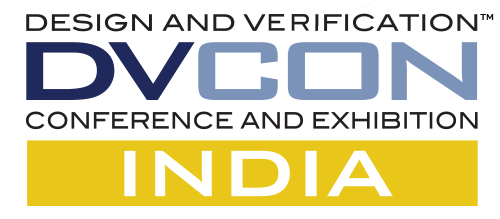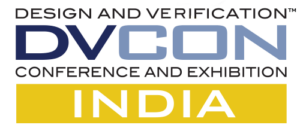Call for Papers
The Design & Verification Conference & Exhibition is the premier conference on the application of languages, tools, methodologies and standards for the design and verification of electronic systems and integrated circuits. The focus of this highly technical conference is on the practical aspects of these technologies and their use in leading-edge projects to encourage attendees to adopt similar techniques to improve their own design and verification flows.
The theme of this year is “Application to Analytics – A2A“. This call for abstracts solicits for papers and corresponding presentations that are highly technical and reflect real-life experiences and emerging trends in various domains. Submissions are encouraged in (but not restricted to) the following areas:
TOPIC AREAS
ARCHITECTURE EXPLORATION & SYSTEM DESIGN
- High-level synthesis from ESL languages
- Bridging Virtual prototyping, Simulation, Emulation and FPGA prototyping
- Usage of higher level of abstraction, System-C & Performance modeling etc.
- Transaction-level modeling (e.g., System-C TLM)
- Hardware and Software co-development and co-verification
- Automotive system design, requirements driven development
- New Algorithms in HW/SW co-design
- Low-power architecture exploration
- RISC-V based system modeling
DESIGN EXPLORATION & IMPLEMENTATION
- AI/ML inside or based Design implementation
- RISC-V based designs and systems
- FPGA-based designs
- HW Partitioning
- Multi-language design and verification
- SoC and IP Integration Methods and Tools
- Configuration management of IP and abstraction levels
- Designing for functional safety and security, requirements driven verification
- Latest Low-Power Design Implementation Techniques
- Clock/Reset Domain Crossing Design and Verification
- Constraints Verification
- Advanced design methodologies
- Chiplets and 3D-IC Design methodologies
DESIGN VERIFICATION & PRE-SI VALIDATION
- Usage of AI/ML in verification
- Coverage Metrics and Big data analysis
- RISC-V verification and validation
- Chiplet and 3D-IC Verification
- New Algorithms in HW/SW co-verification
- Advanced methodologies, Reuse and Automation
- Multi-language design and verification
- Automation in Verification Process Optimization
- Verification processes, Regressions and Resource management
- Debug and analysis of complex designs
- Applications of the Accellera Portable Stimulus Standard
- Verifying for functional safety and security
- Formal Verification techniques and methodology
- Applications of Static and Formal techniques
- Low Power Verification techniques and methodologies
- Hardware based Verification – Emulation & Prototyping
ANALOG AND MIXED SIGNAL DESIGN & VERIFICATION
- AMS modeling for concept and System-Level Design
- Application of mixed-signal extensions in verification (e.g., UVM-MS)
- Big A, small D designs and verification
- Real-number Modeling Approaches
- Self-checking testbenches in Analog & Mixed Signal Verification
- Advanced methodologies
- Tackling the complexities of analog design in advanced process nodes
POST SILICON VALIDATION
- Post silicon validation techniques- ATE, Bench, System level platforms
- Power, Performance, Thermal measurement/correlation techniques/challenges
- Yield, DPPM, Diagnostics, Big data Analysis, Failure analysis, HVM
- Use of AI/ML to improve Post Silicon Validation Process
- Circuit / System marginality validation techniques
- ATE to bench correlation methodology
PAPER SUBMISSION PROCESS
Note: New Submission Guidelines for DVCon India 2024.
An initial submission called extended abstract is required before the full paper. The extended abstract should provide enough details so that the Technical Program Committee can evaluate the potential quality of your completed paper and the interest of the DVCon attendees in your presentation. An extended abstract is expected to include the following details. The submission should be between a minimum of 600 words and a maximum of 1200 words (approximately 2 pages, not including diagrams, figures or tables).
Template available in Resource Center on DVCon India 2024 website.
.
The extended abstract submission should include:
- Title: The paper title.
- Contact information: Name, affiliation, phone number, email & mailing address for all authors.
- Short Abstract: Outline that clearly states the context and motivation of your contribution, approx. 100 words.
- Related Work: Identify other work on which this submission will be built, and the novelty of the paper.
- Application: Clearly describe the technical contribution, reflect real life experiences, and its industrial application.
- (Preliminary) results: Summarize the results. State how these differ from previous work or state-of-the-art on the same subject.
- Conclusions: Summarize major conclusions and findings presented in the paper.
Accepted authors will be invited and agree to do the following:
- Submit the final version of the paper (max. 8 pages) after incorporating feedback from the TPC
- Ensure corporate approval for the paper/presentation content by 25th August 2024
- One Author must Register for the conference
- Submit a copyright form
- All accepted authors agree to present an oral or poster presentation at the conference (18th – 19th Sep 2024).
Please note: Consistent with the requirements for other DVCon India presentations, your presentation may contain your company logo only on the title slide and should use the provided templates.
Please do your initial submission via the EasyChair – Submit Here by May 5, 2024.
Please select the appropriate Topic Area when submitting the abstract.
The website will open on Feb 28th, 2024.
IMPORTANT DEADLINES
February 28, 2024: Website Open for submission – EasyChair – Submit Here
May 5, 2024: Deadline for initial submission
July 8, 2024: Final Accept/reject notification sent to all Authors
August 5, 2024: Final paper Submission for TPC/Shepard Review
August 26, 2024: Speaker confirmation, Presentation & Copyright forms due
September 18 – 19, 2024: Conference
CONFERENCE SCHEDULE
September 18, 2024 — Tutorials and Panels
September 19, 2024 — Tutorials, Technical Papers and Poster Session
DVCon India honors the Best Paper/Presentation and Best Poster submissions. The awards will be selected by the attendees at DVCon India based on the quality of both the paper and the presentation.
More information on DVCon India can be found on www.dvcon-india.org
Technical Program Chair
Karthikeyan Subramanian
Google
karthikeyansk@google.com
Technical Program Vice Chair
Girish Marudwar
Synopsys
girishm@synopsys.com
Technical Program Vice Chair
Shreya Dasgupta
ADI
shreya.dasgupta@analog.com
COUNTDOWN
Days Until Conference
#DVCONINDIA


